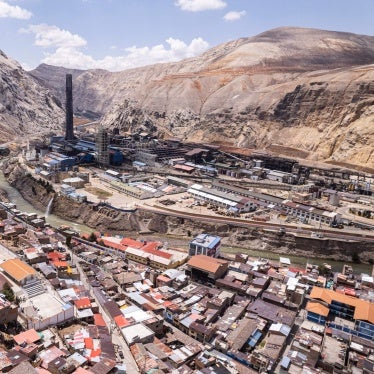We are writing to urge the European Union to take immediate steps to suspend European aid to the so-called Plan Colombia.
The decision by President Clinton on August 22 to invoke a "national security interest" waiver eviscerates human rights conditions contained in legislation approving $1.3 billion in aid. This decision sends a clear message at a crucial moment to Colombia's Armed Forces that the United States will not hold them accountable for gross human rights violations.
Since this aid remains the bulk of the contributions promised so far to Plan Colombia, we believe the effort is fatally flawed and should be reevaluated in light of human rights concerns.
During the prolonged debate over the aid bill in the U.S. Congress, we urged the president and the Congress to include strong human rights conditions on any aid provided. Only in that way, we argued, could the international community be sure that its assistance was fortifying democracy and protecting rights. Despite its rhetoric, the Clinton Administration ignored human rights conditions and invoked the waiver, allowing the United States to fund a military the U.S. State Department itself has reported is abusive.
As you know, the State Department has consistently reported that Colombia's Armed Forces have yet to take the measures necessary to punish human rights abusers within their ranks, particularly the officers who aid and abet the atrocities committed by paramilitary groups. In a report we published in February of this year, which we attach, we documented ongoing, intimate ties between Colombia's three most powerful Army brigades, located in the country's largest cities, and well known paramilitaries. Indeed, our research so far has linked half of Colombia's 18 Army brigades to the paramilitary groups responsible for the vast majority of human rights violations that occur there.
We believe the U.S. decision to waive human rights conditions converts "Plan Colombia" into a policy that exacerbates an already critical situation. Military aid without human rights conditions offers tacit approval of the Colombian military's continuing support for and tolerance of paramilitary groups. Any other programs risk being tainted or, worse, becoming irrelevant.
As you know, the so-called Leahy Amendment remains part of U.S. law. It is designed to prevent most U.S. military aid from funding units and officers with notorious records. But it does not go far enough. The Leahy Amendment applies to only those few units that directly receive U.S. aid. Meanwhile, the bulk of Colombia's military forces continue to be implicated in serious human rights abuse. Vetting is largely secret, and legally only focuses on human rights abuses committed directly by troops. Not on the more common practice of aiding and abetting paramilitary atrocities.
Colombia's high command continues, at the very least, to shield criminals within their ranks and cover up atrocities. Indeed, in June, Colombian Navy colonel Rodrigo Qui‘žnes, believed by government investigators to have set up a death squad and paramilitary groups in the early 1990s, was promoted to general.
Colombia's soldiers continue to facilitate and actively promote the paramilitaries responsible for most human rights violations. Human Rights Watch continues to receive credible evidence that army units actively collaborate with paramilitaries in the field.
Strong human rights conditions are needed to force the Colombian military to break these ties, prosecute abusive officers and their paramilitary allies, keep sensitive intelligence from being provided to paramilitaries, and ensure that government investigators and human rights defenders are fully able to pursue investigations of abuses.
It is crucial that the European Union makes it clear to the United States and Colombia that action against military officers who aid or abet the work of paramilitary groups is an essential prerequisite for receiving any military aid. Since President Clinton has invoked the waiver, thus negating the stated U.S. commitment to human rights, it is essential that Europe withdraw support for Plan Colombia until such conditions are enforced. In this way, Europe would send a clear message that it holds both Colombia and the United States to their promises of furthering respect for human rights.
Critical economic and humanitarian aid could be channeled through alternative sources, including civil society and humanitarian agencies.
As we have made clear, we encourage and welcome support for Colombia's Attorney General's office, the peace process, and nongovernmental and international organizations working to promote human rights and a peaceful end to the conflict. But this support is meaningless if Colombia's military continues to tolerate or actively perpetrate atrocities. The European Union has a central role to play in ensuring that impunity for such abuses is ended.
Sincerely,
/S/
Lotte Leicht
Brussels Director
Human Rights Watch
Jos?Miguel Vivanco
Executive Director
Americas Division







